With so many pressing issues facing this nation right now starting with the out-of-control Covid-19 pandemic, use of USPS for voting ballots, mail-in ballots, BLM protests, and preserving federal buildings/statues, Relief talks stalled through Labor Day, Acting HHS Chad Wolf’s illegal standing, and now election security and the prospect of Congressional ‘watch dogs’ aka Wisc Sen Ron Johnson with all his suggestions that there is inappropriate actions by VP Biden and son Hunter in the (pro-Russian) Ukrainian region which will be discussed at length by the R’s during these last few months before the election. Oh, and let’s not forget about AG Bill Barr’s dropping of the Durham report of the Mueller investigation to add another layer.
Just make the waters muddier, and muddier…
As convoluted as it all gets, it is worth noting what kinds of misinformation will be coming through about election interference AND any number of October surprises which maybe looming - aka Biden/Ukraine, or Durham Report.
Here’s one piece of what the Intel committee and subsequent rogue actions from Sen Johnson coming into play.
A Counter-Disinformation Playbook for Both Parties
By now, the record of Russian attempts to interfere in U.S. political processes is a matter of record.
The Mueller investigation, for instance, led directly to the criminal indictment of over a dozen Russian nationals and multiple organizations connected to the Internet Research Agency, which has ties to Russian intelligence and the network of oligarchs surrounding Vladimir Putin. The indictment detailed Russian personnel, tactics, and even budget line items for everything from payroll to content creation. Numerous digital open-source investigations – including by the Digital Forensic Research Lab (DFRLab) (our own organization) – continued to identify traces of Russian operations throughout 2019 and early 2020, which were flagged for swift removal by social media platforms.
What should have been a tide turning moment in efforts to curb foreign influence came in April 2020, with the release of the third volume of the SSCI’s thorough, multiyear investigation. This volume evaluated U.S. government failures in 2016 and offered recommendations to mitigate the threat of foreign interference. These recommendations were endorsed by Chairman Richard Burr (R-NC), Vice Chairman Mark Warner (D-VA), and all but one member of the committee (Senator Ron Wyden (D-OR) who, while supporting many of the report’s findings, filed a minority view in protest of the opacity of the investigation). The committee concluded:
- That the executive branch should “be prepared to face an attack in a highly politicized environment, either from Russia or elsewhere.”
- That “executive and legislative officials, regardless of party affiliation,” should jointly endorse the findings of the Director of National Intelligence as it relates to alleged foreign interference.
- That “sitting officials and candidates should use the absolute greatest restraint and caution … [in] calling the validity of an upcoming election into question.” They should avoid “exacerbating the already damaging messaging efforts of foreign intelligence services.”
- Finally, that when a foreign information operation is detected, “the public should be informed as soon as possible, with a clear and succinct statement of the threat” to avoid “allow[ing] inaccurate narratives to spread.”
The SSCI report represented a thoroughly considered, bipartisan consensus around a complex, politically contentious subject. It comprehended the clandestine methods by which Russian and other actors turn deep-rooted divisions toward their own ends. It recognized the differences and care that must accompany any allegation of “foreign interference” or “disinformation,” particularly during elections. The recommendations were based on well-documented evidence and spoke to the collective nature of the challenge of foreign influence across society, most notably institutions responsible for or active in elections: the whole of government, political campaigns and advocacy groups, independent media, social media, and most of all, citizens. It especially understood the need for U.S. officials to speak in a unified voice on such issues to prevent further misinformation from taking root.
Unfortunately, by the time the SSCI report offered this roadmap, some U.S. officials had already begun to undermine its core recommendations.
2020 Warnings: Heeded and Unheeded
The “highly politicized environment” that the SSCI report warned of has come to pass – and it’s even more dire than we expected. Those in government with the solemn duty to ensure and protect our elections are grappling with an unprecedented process of coordinating an election in the midst of a public health crisis that prevents large gatherings and an onslaught of disinformation about voting eligibility and electoral processes (much of which comes from the Oval Office).
And this is before one considers the specter of foreign election interference. So far in 2020, DFRLab has counted ten distinct, credible allegations of foreign influence operations made by U.S. agencies (including foreign influence activities targeting the Democratic primary or spreading COVID-19-related disinformation). An additional twenty attributions have been made by technology companies and civil society organizations. The majority of these attributions have focused on Russia.
Well before the public assessment released by the Office of the Director of National Intelligence last week, senior officials continuously warned of foreign election interference. In a February USA Today op-ed, senior administration officials charged with protecting elections – including Attorney General Bill Barr, FBI Director Chris Wray, acting-Secretary of the Department of Homeland Security Chad Wolf, then-acting Director of National Intelligence Joseph Maguire, and Director of the Cybersecurity Infrastructure Security Agency Chris Krebs – wrote, “As long as the threat remains, there is work to be done … we remain watchful of any malicious activities from cybercriminals and from foreign actors like Russia, China and Iran.”
However, when asked under oath during July 29 testimony before the House Judiciary Committee whether it would be acceptable for the president or a presidential candidate to accept foreign help, Barr struck a very different tone, trying to qualify the nature and extent of the aid. Only when pressed did he agree that it would, indeed, be inappropriate.
Similarly, in a July 26 primetime ABC interview, White House Chief of Staff Mark Meadows tried to dismiss concerns about foreign disinformation by drawing a line between “interference” and “influence.” “There’s a big difference between foreign interference and foreign influence,” he said. “They continue to try to influence, as everyone does across the globe, but in terms of actually affecting the vote totals and interacting, I think we’re in a good place.” While there are indeed important differences between the two phenomena, virtually all of Russia’s malign activities in 2016 would be deemed permissible under Meadows’ dichotomy.
While an enormous amount of work has been done by national security professionals and civil servants to build more resilience against foreign interference, these carefully constructed warnings of the threat have been weakened by more off-the-cuff responses from senior officials that seemingly provide space for the primary activities associated with the threat.
Not Recommended: Foreign Influence About Foreign Influence
In the Senate – and set against the recommendations of his SSCI colleagues – is the probe of the Senate Homeland Security and Government Affairs Committee, chaired by Senator Johnson. This investigation seeks to examine Joe Biden’s interactions with Ukrainian officials, as well as those of his son, Hunter, who served for five years as a board member of a Ukrainian energy company.
While Johnson promised an interim report of findings by September 15 of this year, thus far, the inquiry has produced insinuations and half-truths instead of new findings. The inquiry has also seized the news cycle at critical moments of the ongoing presidential election, producing tantalizing headlines with little to back them up.
Most important with regard to national security, the inquiry has also become an irresistible target for pro-Russian Ukrainians, who appear to be using Johnson’s probe to brand outlandish – and debunked – conspiracy theories with the imprimatur of the United States Senate. As a current national security official told Politico , it should be “out of the question to consider [the Johnson-chaired probe’s] information legitimate investigative material.” The fact remains that using foreign influence efforts in the name of curbing foreign influence makes matters worse.
The probe’s inspiration can most directly be traced to a November 2019 investigation by Senate Judiciary Committee Chairman Lindsey Graham (R-SC) into communications between the elder Biden and Ukrainian officials. This earlier investigation was launched at the behest of President Trump as he sought to deflect attention away from congressional impeachment hearings that focused on his own alleged abuse of power in pressuring Ukrainian officials to produce statements that would hurt Biden politically, for which Trump was ultimately impeached. The effort faded by mid-February, as Biden faced setbacks in his campaign for the Democratic presidential nomination.
Johnson’s own public investigation began on March 1, one day after Biden’s commanding victory in the February 29 South Carolina primary. Johnson’s probe issued its first (and only) subpoena on May 20, as a Fox News poll found that Biden had an 8-point national lead over Trump. The investigation’s public profile has continued to rise through the summer, although it has yet to officially gather more information or release any evidence of wrongdoing.
Politically motivated probes are nothing new in the history of the U.S. Congress. What distinguishes the Johnson inquiry from previous efforts, however, is the sort of “evidence” that it has attracted. The first intended witness for Johnson’s inquiry was Andrii Telizhenko (whom Johnson had first met in July 2019), a confidante of Trump’s personal lawyer, Rudy Giuliani, who had previously fomented a disproven conspiracy theory that Ukraine – not Russia – hacked the servers of the Democratic National Committee in 2016. Telizhenko had also previously lobbied Republican officials on behalf of Ukrainian television channels controlled by Russian interests. Johnson’s committee dropped him as a witness in late March, after other senators expressed concern that he was essentially being used to launder a Russian disinformation campaign.
More recent and alarming have been the actions of Ukrainian parliamentarian Andriy Derkach, another Giuliani associate and prospective Johnson witness. Derkach’s father was a Russian KGB operative, and he himself attended a Moscow graduate program with close ties to Russian intelligence services. In May, Derkach released years-old edited recordings of private phone calls between Biden and former Ukrainian president Petro Poroshenko, which he claimed to have been leaked by “investigative journalists.” The tapes were played at a press conference hosted by Ukraine-Interfax, which is owned by the Russian Interfax news agency.
Although the tapes contained no new revelations, their release was clearly intended to reinvigorate conspiracy theories around Biden and Ukraine. A third Giuliani associate and former Ukrainian lawmaker, Oleksandr Onyshchenko (currently on the run from Ukrainian authorities on charges of embezzlement) told BuzzFeed on July 24 that more such releases would come “closer to the election.” He also expressed his desire, along with Derkach, to provide direct testimony to the Johnson investigation. When Johnson was pressed on July 23 about whether his investigation had received or intended to publicize such evidence, he was initially noncommittal.
Call and Response
In response to concerns raised by Democrats as well as public reporting citing the fears of anonymous intelligence officials, Senator Johnson defended his inquiry in an August 6 letter to Democratic colleagues. Ironically, he alleged that it was Democrats who had amplified disinformation by drawing attention to the Ukrainians’ claims and vulnerability of his own investigation; arguing they had been “more successful than any Russian troll-farm” in spreading falsehoods.
On August 7, the Office of the Director of National Intelligence (ODNI) released a public update on election threats by state actors. The only specific example provided of a “range of measures” being employed by Russia was the mention of one of Johnson’s prospective witnesses, Andriy Derkach, and his efforts spread claims of corruption by publicizing doctored and leaked phone call recordings.
As media reporting of ODNI’s public disclosure and concerns of Johnson’s inquiry intensified, the Senator published another scathing, 11-page letter on August 10. Johnson re-litigated, among other things, the FBI’s investigation into foreign interference in 2016 elections, presenting a winding narrative that sought to tie past and present investigations together. He also made clear that the blame for any ongoing foreign interference lay with the “relentless” left. However, compared to SSCI’s exhaustively documented, multi-volume report, Johnson’s letter was long on allegations but short on supporting facts, as Goodman and Rangappa’s article demonstrates.
Both of Johnson’s letters flatly denied his inquiry directly received any information from Ukrainians; a counterpoint that doesn’t account for the fact that the inquiry’s origins are rooted in information surfaced by pro-Russian Ukrainians regardless of whether they provide direct testimony or not. It is true that each of these prospective anti-Biden witnesses has loudly denied any ties to the Kremlin. Their efforts have been so transparent and buffoonish that this may well be the case. But it remains clear that it is Johnson’s probe itself – ostensibly an investigation of foreign interference – which is directly and indirectly elevating these (clearly unreliable) foreign sources of information.
Sources whose narrative has now been laundered into multiple news cycles and amplified by an enduring Senate inquiry.
Not Again
There are clear parallels between the hack-and-release component of Russia’s efforts ahead of the 2016 election and potential exploitation of the current Johnson inquiry. Then, as now, Russia-adjacent actors used dumps of “secret” but fairly innocuous material to provide fodder for far-right content creators and conspiracy theorists. No matter how fact-checked the content was, the sheer act of repetition made it seem true as it gradually captured the popular imagination and polluted the information ecosystem. In 2016, these materials were released in a steady drip that intensified in the lead-up to election day, which is what Onyshchenko has promised to do in 2020.
And then, as now, these Russia-adjacent actors used or benefited from a sympathetic third party with incentives to amplify disinformation across the American political system, ensuring their releases were shared as widely as possible. In 2016, that Russian target was Julian Assange and Wikileaks. Today, it may well be the United States Senate.
The great irony is that a number of U.S. officials – including Johnson’s Republican Senate colleagues – have already warned against exactly this sort of threat and proposed steps to mitigate it. The function of a Congressional inquiry is to conduct oversight, not to replace the information gathering, analysis, and assessment of the U.S. Intelligence Community, which is more rigid, systemized, and divorced from politics. There is good reason why intelligence analysts do not have to campaign for re-election.
Senator Johnson’s inquiry has fallen short of the bipartisan recommendations to guard against foreign influence and disinformation made by his colleagues at SSCI. It should be the duty of Johnson’s probe and all similar investigations to work with appropriate elements across the United States government charged with national security, to show restraint and caution when insinuating foreign interference, and to rapidly and publicly disclose evidence of such interference.
A common trope used to build support for bipartisan national security efforts is that our politics should end at our borders, but foreign influence using disinformation has weaponized the base incentives of our politics against us. Disinformation about disinformation is in itself, of course, a form of disinformation, and makes our ability to identify, expose, and explain it much more difficult. Likewise, foreign influence affecting how we assess previous foreign influence, without transparency or evidence, makes us more vulnerable to malicious efforts by foreign adversaries. Both are at play in the 2020 elections, posing a major challenge to the strength of American democracy.
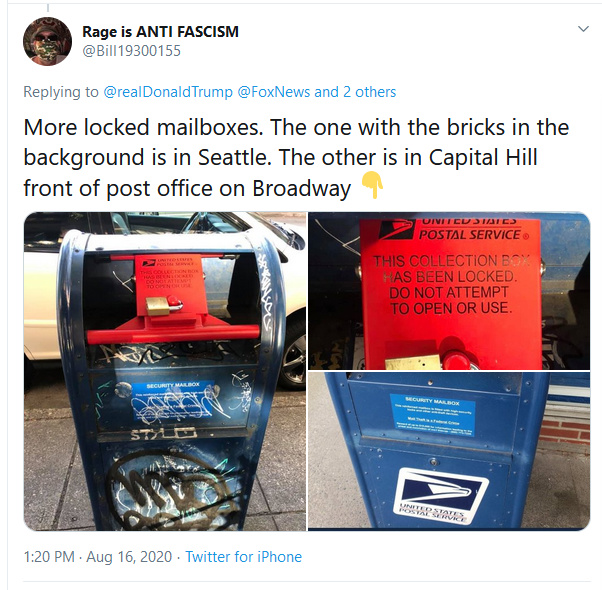
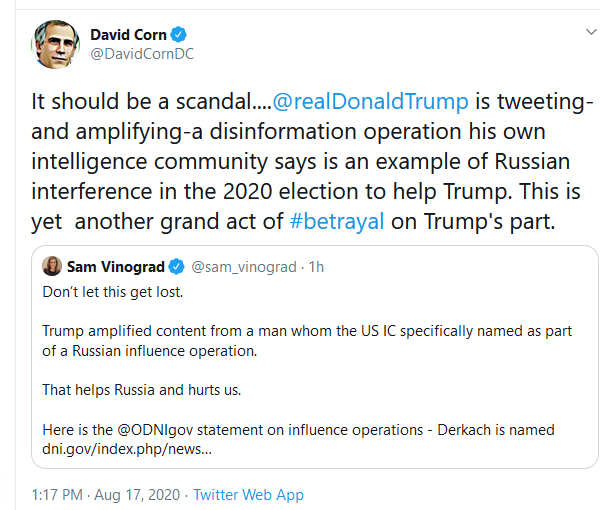
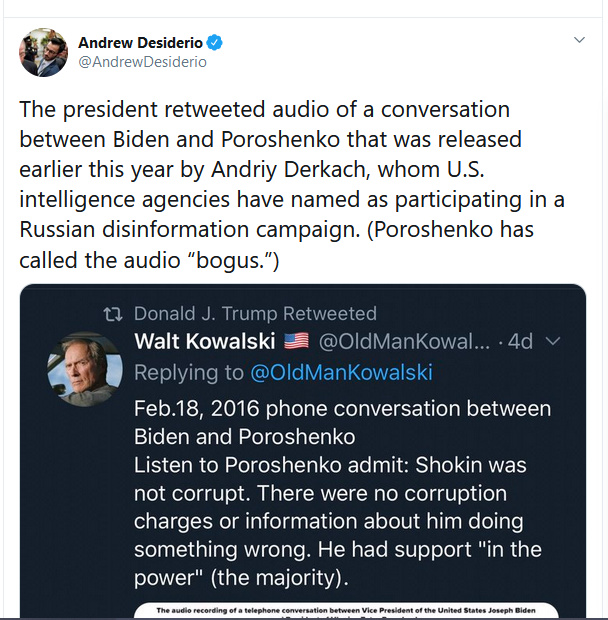
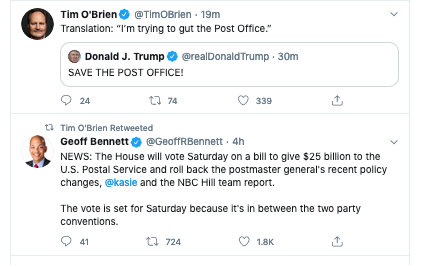

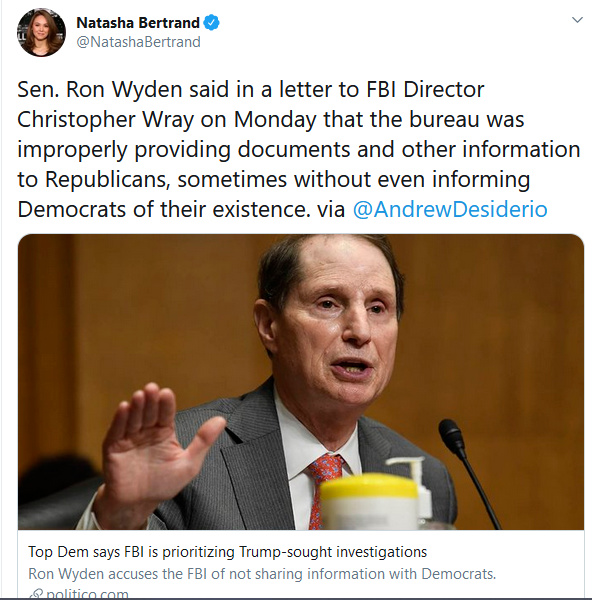
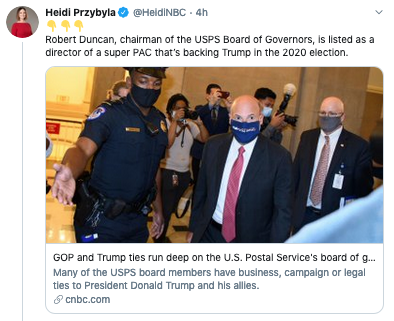

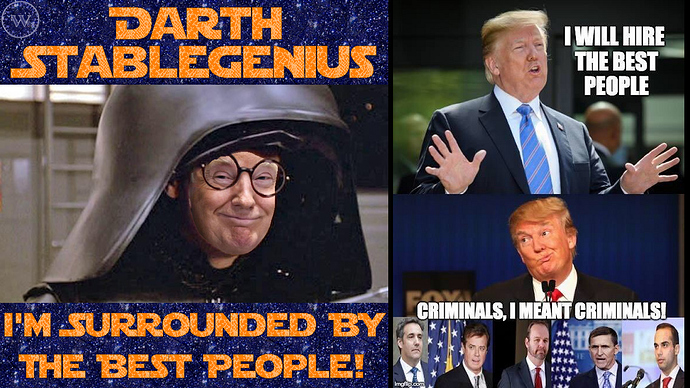




 at this boat
at this boat